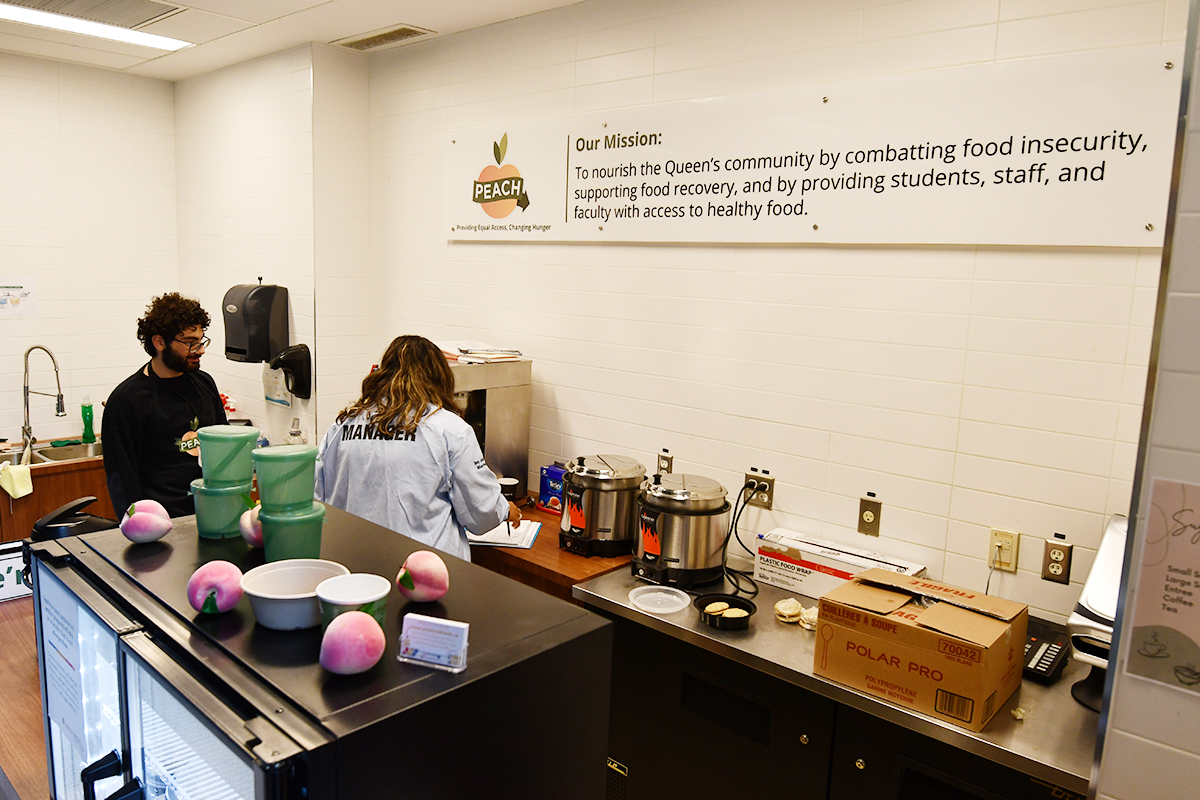New pay-what-you-can market supports student food security
September 23, 2022
Share

As the cost of food rises, it is becoming increasingly difficult for students to afford healthy and nutritious food. According to the Queen’s 2021 Student Experiences Survey, 13 per cent of students who completed the survey reported going hungry because they did not have enough money for food. Twenty-four per cent of students reported that they sometimes or often worried whether their food would run out before they received money to buy more.
The impacts of food insecurity are wide-spread and have been shown to have a negative effect on learning outcomes and social-emotional well-being. To improve student health and address food insecurity, Student Affairs, and the Alma Mater Society (AMS) have collaborated to open a new pay-what-you-can market on campus.
Food insecurity and sustainability
The Providing Equal Access, Changing Hunger Market (PEACH) is an eight-month pilot project that will distribute untouched food from across Queen’s Hospitality Services to students. The PEACH Market is located in the New Medical Building near the main entrance on Arch Street. The new market is staffed by student volunteers and is open Monday, Wednesday, Friday between 11 a.m. -2 p.m.
It's mission is to nourish the Queen's community by combatting food insecurity, supporting food recovery, and by providing students, staff, and faculty with access to healthy food. Untouched food rescued from across Queen’s Hospitality Services’ locations is packaged each day for offer at the PEACH Market. A variety of soups and entrées are a few of the items available for customers to take away and enjoy.
“The transition to independent living, and balancing the responsibilities that come along with it, is a unique challenge to the student demographic which affects their ability to buy and prepare food,” says Maddy Ritter, Student Food Collective Coordinator. “This new market will be an important service that helps create opportunities for students to access to a variety of nutritious foods and create a culture that supports healthy lifestyles.”
The PEACH Market’s accessible operating model will create an inclusive and destigmatized space on campus to support the health and wellbeing of vulnerable individuals. The self-selecting, sliding scale model, works by arranging menu items into recommended tier pricing at $1, $3, $5, or an open rate to allow customers to voluntarily pay whatever they are able.
“Different students have different needs and not all students are comfortable accessing a foodbank or free meal program,” says Susan Belyea, the new chair of the Queen’s Food Insecurity Advisory Committee, and director, Ban Righ Centre. “The PEACH Market is unique in that it will operate like a regular takeout campus retail food location, providing a new and dignified option for students to access healthy food.”
In addition to removing financial barriers that prevent access to food, the presence of the PEACH Market on campus will help build awareness of the root causes of food insecurity and promote sustainable practices through the reduction of food waste on campus.
“The PEACH Market is one of the university’s only partnerships with student groups on campus and aims to address food insecurity and its implications on students,” says Tina Hu, vice-president of Operation, AMS. “By providing a reliable source for healthy, well-balanced, and ready to eat meals, students can spend less time worrying about their nutritional needs and can spend more time focusing on their education”
Building healthy communities
Among the groups addressing student food insecurity at Queen’s are the Student Food Collective (SFC) and the Food Insecurity Advisory Committee (FIAC). These groups work to gather information, analyze data, and propose solutions across five strategic areas: education and awareness, the environment, community, skill building, and policy. The PEACH Market implements goals outlined in the 2021-2022 Food Insecurity Report which set forward a plan to explore pay-what-you-can operating models.
Contributing to existing efforts to address food insecurity on campus, the market advances work on United Nations Sustainable Development Goal #2: Zero Hunger by providing affordable, healthy food. The PEACH Market also complements existing programs such as the AMS Food Bank, Swipe it Forward Queen’s, and Fresh Food Boxes. Hospitality Services will continue assisting community partners with addressing food insecurity in the Kingston area through regular food donations while distributing rescued food to the market.
A full list of supports and resources can be accessed by visiting Student Affairs’ Food Access Resources page.
Learn more about the PEACH Market by visiting the Hospitality Services website.